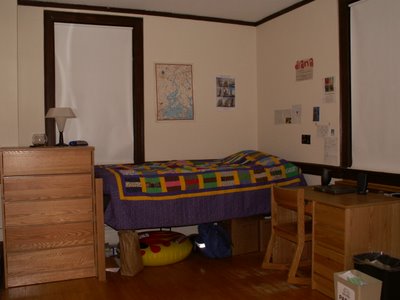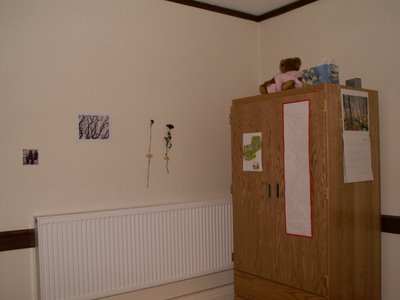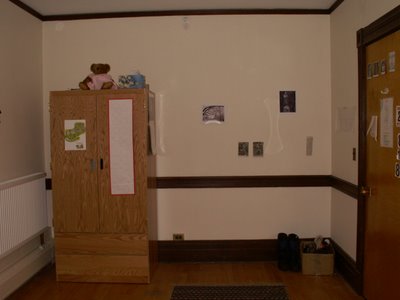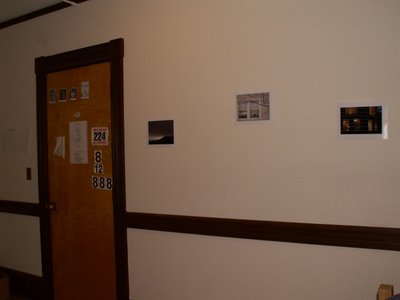Today I did "animal rescue" with another volunteer and the long-term volunteer that does it every day. First, we organized the warehouse where they keep the cat and dog carriers and cages and everything that they can give out to people, including assembling a lot of cat and dog carriers. We really made the warehouse (which was the space under stadium bleachers) look much better.
Then the "animal rescue" began in earnest. We had a certain section of East Biloxi to cover, so we drove down every street, and every time we saw a dog or cat, we stopped. We asked the people nearby (because there were almost always people nearby) who owned the animal, to which the answer was usually "I do." We asked them if they would like food for the animal, to which the answer was usually "oh, that would be great, thanks," so we gave them cat or dog food -- and a lot of it -- from the supply in the warehouse. We also asked if the person wanted to keep the animal, and usually they did, but in a few cases they were just feeding it because it was a stray that hung out on their property, so we put them on a list to come get the animal next week. (At the end of March, they will drive a cargo van load of animals "up north" to be adopted.)
People were usually very happy to learn that they could get free food for their pets. It is really hard for people to feed their pets, since they often don't have work, so it costs a lot. One guy had seven dogs, including some big ones. We gave him two really big bags of dry dog food. He told us about his grandmother, who had "a lot of cats" and probably needed food for them, so we went to her house and even though she wasn't there, we left 12 small bags of dry cat food on her porch (with a business card so she'd know who left it).
For people who were keeping animals but had a significant need for food for them, they go on a list of people who will get weekly deliveries of food. So each week, someone from the organization will drop off one or two big bags of dog or cat food. That's pretty neat. I guess there are a lot of people there who really care about animals, and who have donated all of this food so that "Katrina dogs" and cats won't go hungry.
One guy had a dog that he was pretty sure had heart worms. Heart worm treatment is very expensive, but there is some new government grant where if the dog is a "Katrina dog" -- essentially any dog living in the Gulf Coast during the hurricane -- it can get heartworm treatment for free (so long as the treatment starts by the end of March). This guy really liked his dog, but he had no money, so he was really glad that this program existed, and the long-termer animal rescue guy we were with helped to set him up with an appointment at the vet, and make sure the treatment would be reimbursed.
This guy was living with his uncle, because although they lived on the same street, the nephew with the dog had lost everything, and the uncle's house was basically rebuilt by now, because he had flood insurance. The uncle invited us into his house, where we sat around the table and talked with him and the nephew about the dog and whatever else. He asked us, "can you believe the water in here was seven feet deep?" And you really can't. In most houses, seven feet is about the level of the ceiling, so basically the whole first floor was full of water, like a fishtank. Can you imagine that in your house? It's almost inconceivable, the ocean in your living room, in your kitchen, all of your stuff saturated and filled with water. But this guy had flood insurance, and the insurance company paid up, so he had, in the last seven months, put in a lot of work and gotten his house back to normal.
The nephew had stayed in his house during the hurricane, and when the water got to a certain level, he realized he had to get out of his house, because it was going to flood completely. So he put the dog under one arm and swam, swimming with one arm, across the street to his parents' house. The problem (one among many, obviously) was that the street was essentially a river with flowing debris, so he had to time it just right when he was going to cross the river/street, so he wouldn't get killed by the debris floating by at a high rate of speed. Luckily, he and the dog both got to his parents' house, and somehow they all survived.
Others were not so lucky. In Biloxi, since the tidal surge was about 25 feet, many people went up into their attics as the water was rising, and then when it rose into the attic, there was nowhere to go, so they drowned in their attics. (Those who survived by staying in attics that didn't flood say they'll always keep an axe in their attic from now on.) In New Orleans, people went up to their attics when the levees broke, and while the water didn't get up to the attic, it also didn't recede for two weeks, so they starved to death in their attics after two weeks up there. (The water receded in Biloxi within about 12 hours, if not fewer.)
Yesterday we talked to a Biloxi Public Works worker who had horrible stories to tell. He had been a first responder, so he walked along the streets immediately after the hurricane. He had personally found seven bodies. I cannot imagine how horrifying and scarring that would be. His friend was in a rescue boat, and his cat jumped out of it into the water. The friend dove in after his cat, and never came back to the surface. Down the road from where we were, a Vietnamese family of 13 all died in their house.
I thought that the people who stayed in their houses during the hurricane were pretty stupid. I mean, there was a manditory evacuation, and it was a Category 5 hurricane with the strongest part predicted to fall on southern Mississippi. How could people not leave? But today I heard a reason why.
People in Biloxi are very poor. I learned of one family that had $400 in the bank when the mayor ordered a manditory evacuation. If they left the city for however many days the hurricane would take, it would wipe out all of their savings to stay in a motel. So they couldn't afford to leave.
Of course, if they died in their house, the $400 wouldn't do them much good. Luckily for them, they survived.
In the afternoon, we were done at about 2:00 with the animal rescue, so we helped out a group that was doing mold. In the morning when the group entered the house, it was really moldy. A previous group had taken out all of the remaining furniture, bathroom fixtures, drywall (walls), actually everything but the studs (2x4s in the walls) and floorboards. Today's group's job was to scrape the mold off of everything that was left. Apparently this was one of the moldiest houses they had yet seen, with green, black, and white mold growing all over everything. But they scraped, brushed, and otherwise extracted all of the mold, and then vacuumed it up.
Our job in the afternoon was to wipe. We took a special mold-killing liquid, dipped our cloths in it, and rubbed every surface to get off the mold dust from the surfaces that they had scraped in the morning. The cloths got very dirty very quickly, so we changed them often, and we scrubbed down the whole house in about an hour. While we did this, we wore "respirators," which is essentially a gas mask, filtering out 99.97% of the particulate matter in the air. (They make you sound like Darth Vader, except harder to understand.) We wore gloves, but mine had holes, which I realized after a while (why are my hands getting wet?). Luckily it was mold dust mixed with mold-killing liquid.
It is interesting, this mold killing, because no one has ever studied how to do it before. FEMA and the EPA are going on this one study that was done on just three houses, which is kind of statistically ridiculous in terms of accuracy, but it's the only study to go on. The experts in mold came down and saw the Hands On process, though -- the scraping, wiping, and then painting over with mold-sealing-in paint -- and said it was way overkill and definitely enough, which apparently they knew. The question is what the happy medium is between, say, spraying Clorox on the mold (doesn't work) and the Hands On process (extremely effective) where it would kill a lot of mold without four days' labor on each house.
Apparently they are doing a study now with 106 identical houses in the same region, trying out the various methods of mold killing to see which one maximizes effectiveness with the least amount of labor. This seems like it could potentially be a statistically valid study, and probably will inform future mold killers.
In lighter news, we got prizes today for taking out the trash. I was sorting recyclables, and I got a prize for that, too: Bling. That's right, I said the word "bling." I got a Mardi Gras-like necklace with black plastic beads and a gold plastic medallion that says Cuervo on it. The Hands On folks found a big box of this kind of stuff when they were helping clean out one of the casinos after the hurricane, so they brought it home and hand the bling, if you will, out to the volunteers for noble reasons, such as sorting the recyclables. I think this necklace I am now wearing has some great significance, even if it is a cheap necklace sponsored by an alcohol company and looted from a casino.
I went running for half an hour today. It was great. I only got shouted at a few times, and I felt just great, since I haven't been doing much running at all. I wanted to run along the beach on Route 90, but wouldn't you know, Katrina had the nerve to tear up the whole sidewalk, so there is nowhere to run. So sad.
We are losing a few Williams kids, but we gained five new ones tonight, so we should have a good contingent here for the next week. The Williams group will be here until early Sunday morning, April 2. If you have nothing better to do (and really, what better do you honestly have to do than help the people who need your help the most?) you should really consider coming down sometime in the next two years. No, really, these organizations, and in particular Hands On, will be here for two years. The weather's great, the company is awesome, and the work and the people you meet will certainly be unforgettable. More on that later.






